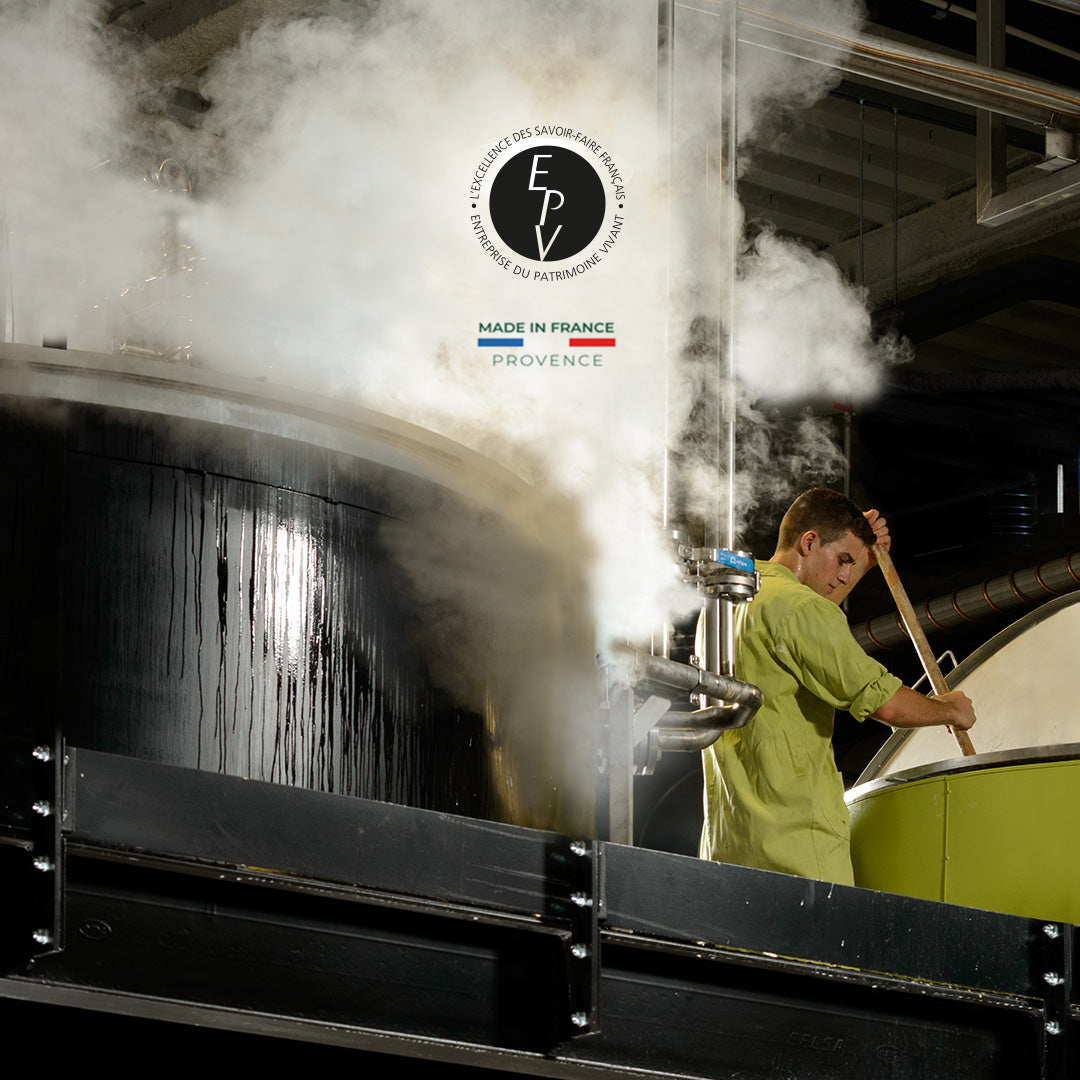FAQs
General questions
An oil qualified as ''purified'' complies with the most demanding regulations in terms of contaminants and toxicity. For this, it is filtered (filter, sieve), washed (with water), deodorized (with steam), bleached (with activated carbon).
For example, for our black soaps, we guarantee simple and pure formulas: 100% purified linseed oil, and 100% purified olive oil. It is a guarantee of quality and safety.
Physiological pH: around 5.
Mild pH: between 5 and 7
Neutral PH: around 7. Acidic PH: less than 7.
Basic / alkaline pH: greater than 7.
Soap pH: around 10.
This is a pH adapted to the use of the product.
It is a preservative, which stabilizes the color and the smell. Product not authorized in the organic charter, because it is not biodegradable.
Product derived from petrochemicals, criticized on the environmental level. PEGs are not authorized in the organic charter.
Component mainly present in foaming agents. Sulphates aren't banned, but get bad press because they're potentially irritating (although that's not been proven yet).
Marseille's soap
We are a manufacturer: from placing the oils in a cauldron to the final moulding, our Marseille soaps are entirely manufactured in Salon de Provence in our modern factory. We control the entire manufacturing process, which is carried out by our master soap makers.
The weight of Marseille soap is that weighed at the end of production. It then drops slightly as it dries and loses some of its water. It's a normal process.
Organic Marseille soap does not exist because olive pomace, present at 60% in the total of vegetable oils used for the manufacture of green Marseille soap, does not exist organic. In fact, the required minimum of 10% of ingredients from organic farming is not reached. To our knowledge, there is no certified organic Marseille soap on the market.
Originally, Marseille soap was only prepared with olive oil. But from the 19th century, other oils were discovered and added to its manufacture: palm, coconut or peanut oils.
Palm oil is used for its hardening properties.
Coconut oil is used for its foaming properties.
At present, palm oil cannot be substituted in all our soaps (white soap, small soaps, for example), nor in all cosmetic products. We are looking for viable alternatives but in the meantime, we have chosen that all our soaps containing palm oil are made from RSPO palm oil, or organic depending on the range. Failing to eliminate palm oil (cosmetics is not the biggest consumer of palm), it is already better to use RSPO palm than conventional palm. The RSPO association has the merit of pushing producers to turn to sustainable cultivation and pushing to change mentalities.
Regarding Marseille soap, the palm is not added for economic purposes but for reasons of efficiency and quality of use for the consumer:
It helps to boost the foam: even if it is true that the foam is not a guarantee of good cleaning, the foam allows the soap to spread more easily and therefore the quantity of soap to be used on the skin be less.
It also facilitates rinsing. All this is better for the skin (less product on the skin) and more interesting for the consumer who consumes less soap.
With palm-free soap, the soap foams much less and does not “stick” to the skin, consumers tend to insist on their skin. The palm also makes the soap harder and therefore prevents it from melting unnecessarily at the edge of the tub and increases the life of the soap. In fact, palm-free soap is more sticky and sticky on the sink (mush effect) and therefore deteriorates much more quickly. The palm is a better cleanser than the olive while having a soft and stable foam. The fin is more stable over time; it goes rancid less quickly.
The olive/palm/coconut mix is no coincidence. Each oil brings its own benefit to Marseille soap; foaming, hardness, emollient, volume of foam or smoothness, cleaning power….. For example, coconut oil has a very high hardness power, so it is impossible to make a 100% coconut soap, it would be so hard that it would crumble. The olive is very emollient, softening but very weakly cleansing and very low foaming, it is also sensitive to oxidation and has a strong sticky/gooey effect on the sink. The palm is a good cleanser, a good foamer and gives a fairly hard soap but is a little less softening, emollient than the olive.
Each oil has its criteria, calculation software makes it possible to predict the behavior of the soap from the oils used and therefore to choose the most suitable recipes
Our Marseille soap consumes 4 times less water and 7 times less energy thanks to an innovative manufacturing process, which required 3 years of research, during which we carefully analyzed all the stages of the traditional process to better understand it. .
In addition, there is no water discharge: a tank stores all our manufacturing water which will be reprocessed once a year by a specialized actor.
Finally, our Marseille soap is easily biodegradable.
Because our improved and patented manufacturing process preserves the glycerin naturally formed during manufacturing at the heart of the soap . This natural glycerin is recognized for its protective and moisturizing properties. Our Marseille soaps contain more glycerine than most moisturizers.
Yes, our Marseille soap is certified Cosmos Natural by Ecocert.
Since January 2017, the COSMOS standard has been European.
It requires in particular:
- Ingredients from renewable resources and transformed by environmentally friendly processes
- Minimum 95% of the total ingredients are of natural origin. – Our Marseille soaps are 100% natural
- Environmentally friendly manufacturing, cleaning procedures
- Transparency for the consumer
- Obligation to be certified by an independent certification body (ECOCERT).
This standard is demanding in terms of naturalness and environmental protection.
It is a sign of tradition. The real traditional Marseille soap must have the 72% stamp.
This means that the soap contains a minimum of 72% oil in the finish. The remaining 28% are water, natural glycerin, salt, and traces of soda (of natural origin, essential for the manufacture of Marseille soap).
The difference between green Marseille soap and white Marseille soap are the oils used for manufacturing. The use is identical (toilet, linen cleaning, etc.). Olive oil gives the green color to green Marseille soap. Finally, our white Marseille soap contains more glycerin than green Marseille soap, which makes it suitable for very frequent washing.
Genuine Aleppo soap is made in Syria in the city of Aleppo. The manufacturing method is similar to that of Savon de Marseille. In Aleppo soap, laurel oil is used. We do not offer any because all the products in the store come from our factories in Salon de Provence. Marseille soap has properties similar to Aleppo soap. In addition, our Marseille soap contains more naturally produced moisturizing glycerin than a classic Marseille soap, which makes it even softer for the skin.
Black soap
Our black soaps are very gentle on the skin and can be used without gloves because they do not contain any aggressive or controversial ingredients for the health of the skin: without sequestrant, without dye, without preservative, base of vegetable origin, without EDTA, without paraben, solvent-free, petrochemical-free. Tests done on the skin prove this statement. On the other hand, despite its very soft base, we did not ask for any cosmetic control because it is above all a household product.
Linseed oil and olive oil have different properties. However, all our black soaps are identical in terms of use.
Linen is known to dry very quickly and make floors shine. We recommend the linseed oil black soap if you are looking for a delicate lavender or almond scent.
The olive is known to have nourishing and protective properties. We recommend black soap with olive oil if you are looking for a product without perfume (natural smell of olive), hypoallergenic.
Linseed oil and olive oil are the most effective oils; with the best degreasing properties. It is for this reason that traditionally, black soap was made from olive oil in the southern regions, and from linseed oil in the northern regions.
In our approach to innovation, we have decided to extend the range of black soap with a fragrance-free hypoallergenic reference based on olive oil.
Linseed oil comes from Flanders (Belgium), and olive oil comes from Spain (1st world producer). Indeed, the olive oil of Provence is produced in very small quantity and is reserved for the oil of mouth. We use the same olive oil for our black soap soap as for our Marseille soap.
Our black soaps are not organic, they are ECOCERT certified (eco-detergents), ie:
- 95% minimum of ingredients of natural origin (100%)
- raw materials that meet ECOCERT specifications
- an environmentally friendly manufacturing process
- recyclable packaging
Pure Laundry Soap Flakes
Pure soap in very fine, easily biodegradable shavings, the flakes are dissolved during the washing machine, and are suitable for machine or hand washing of all types of laundry (white, coloured, delicate, heavy laundry, etc.). Packaged in a recyclable bag, they are guaranteed without cleaning and artificial color treatment agents, without perfumes (except Rose de Grasse) or synthetic fabric softeners, without parabens, without EDTA, preservatives, super-foaming agents.
Our sequin manufacturing process is historic. Still carried out in our historic factory, it consists of very finely grinding soap paste (twice) and drying it (up to 8 days and carefully controlled).
A bag of 1.5 kg of pure soap in shavings allows 75 washes (with doses of 20 g). A comparative study carried out in France with 20 washing powders shows that our flakes allow savings of 30%.
Tetrasodium etidronate has the role of improving the shelf life of the soap and its stability. In addition, it guarantees effective cleaning and stain removal for laundry regardless of the hardness of the water. There is a lot of confusion between all Tetrasodium, especially on the internet, and especially between Tetrasodium Etidronate and tetrasodium EDTA, which is often controversial and called dubious. However, these are indeed different ingredients, with different INCI names and different ingredient registration numbers. They have the same sequestering functions (to counter the effect of water hardness) but etidronate is easily biodegradable, contrary to what EDTA is accused of.
Soap certified organic
Our entire organic range is certified by Ecocert and Cosmébio. These are independent and very demanding certifications and labels.
Ecocert certification requires 95% ingredients of natural origin. In our certified organic products, it is 99%. Then, depending on the products, there are 98% to 100% of plant ingredients that come from organic farming. Finally, all the products in the range are guaranteed free of: GMOs, PEG, Silicones, EDTA, artificial colours, etc.
All our perfumes are 100% natural. For example, our Olive-Lavandin soap contains essential oil of lavandin, grown and distilled in Drôme Provençale. Recognized for its antiseptic and soothing properties, lavandin delicately perfumes the skin with its sunny Provençal notes. Regarding the color, we only use mineral pigments.
All our packaging is recyclable. Our shampoo and shower gel bottles and caps are made of 100% recyclable material (HDPE). Likewise, the packaging (and labels) of our solid soap bars in sets of 3 are recyclable.
Our washing base is also of vegetable origin, easily biodegradable. In addition, all the stages of production carried out in our factory (in Salon de Provence) are designed to minimize the impact on the environment.
All our certified organic shower shampoos and shower gels are dye-free for skin and hair. You therefore see the natural color of the product, without artifice.
All our solid soaps are based on vegetable oils. The washing base is therefore of vegetable origin.
In addition, we manufacture our shampoos and shower gels from A to Z in our modern factory using only plant-based ingredients for the washing base.
Unlike other scented soaps which have a main fragrance, the ''fruity compositions'' soaps create olfactory feelings, which required specific compositions.
The illustrations on the sleeves are evocations that represent a feeling of the Rampal Latour team, and not necessarily the composition of the perfumes.
Wind of freedom: vanilla touch of tasty madeleines loaded with emotions and childhood daydreams ... the caress of a wind of freedom.
Longing for elsewhere: An accomplice blend of scents of almond and orange blossom in harmony with subtle spicy notes... like a longing for elsewhere.
A festive air: Festive and colorful notes of candy apples and sweets celebrating the exalted joy of friends ... the intoxication of a festive air.
Fruity instant: A promise of pleasure in this generous basket with notes of red fruits... for a deliciously intense fruity instant.
Soaps
Our organic soap bars are of superior quality because they last longer. Until the end, they retain their virtues thanks to 2 specificities:
- The 2 times finer grinding of our soap paste. In our historic factory, our soap artisans grind the soap paste twice to guarantee perfect homogeneity of pigments and fragrances.
- Maximum compression: after grinding, the soap paste is compressed in a single dedicated machine. The result is a homogeneous and very compact bar of soap, of optimum quality and excellent density. They are then molded in our brass moulds.
Our organic soap bars are of superior quality because they last longer. Until the end, they retain their virtues thanks to 2 specificities:
- The 2 times finer grinding of our soap paste. In our historic factory, our soap artisans grind the soap paste twice to guarantee perfect homogeneity of pigments and fragrances.
- Maximum compression: after grinding, the soap paste is compressed in a single dedicated machine. The result is a homogeneous and very compact bar of soap, of optimum quality and excellent density. They are then molded in our brass moulds.
Soap for babies, pregnant women, mature and sensitive skin
Our soap artisans have melted the Marseille soap noodles (without palm) with water.
A breastfeeding woman prefers a fragrance-free product so that baby recognizes the natural scent of her skin and becomes attached to it. Also to avoid making him ingest perfume. The perfume would also camouflage the smell of baby's skin, and could potentially be an allergen for the most sensitive skin. The principle of our Safelife labeled products is to apply a precautionary principle aimed at eliminating allergens and potential endocrine disruptors. To date, we have removed more than 180.
The pH of products for Baby and Women is adapted: between 4.5 and 5.5. Only the liniment has a higher PH (9) in order to counter the acidity inside the diaper.
Yes, some brands put alcohol in the milks to remove the white effect of the product on the skin. We removed it from our formula because it is not gentle on the skin.
The gentle surgras soap is a surgrasse soap with Marseille soap and organic olive oil. It is not certified organic because there is not enough material of biological origin in its composition. Moreover, organic Marseille soap does not exist.







